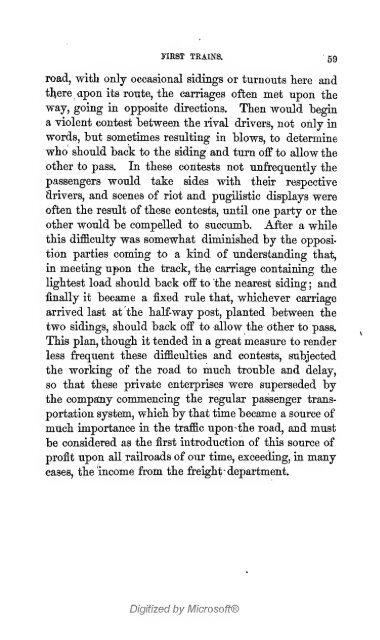The history of the first locomotives in America. From original ...
The history of the first locomotives in America. From original ...
The history of the first locomotives in America. From original ...
Create successful ePaper yourself
Turn your PDF publications into a flip-book with our unique Google optimized e-Paper software.
FIRST TRAINS.<br />
road, -with only occasional sid<strong>in</strong>gs or turnouts here and<br />
tl^ere dpon its route, <strong>the</strong> carriages <strong>of</strong>ten met upon <strong>the</strong><br />
way, go<strong>in</strong>g <strong>in</strong> opposite directions. <strong>The</strong>n would beg<strong>in</strong><br />
a violent contest between <strong>the</strong> rival drivers, not only <strong>in</strong><br />
words, but sometimes result<strong>in</strong>g <strong>in</strong> blows, to determ<strong>in</strong>e<br />
who should back to <strong>the</strong> sid<strong>in</strong>g and turn <strong>of</strong>f to allow <strong>the</strong><br />
o<strong>the</strong>r to pass. In <strong>the</strong>se contests not unfrequently <strong>the</strong><br />
passengers would take sides with <strong>the</strong>ir respective<br />
drivers, and scenes <strong>of</strong> riot and pugilistic displays were<br />
<strong>of</strong>ten <strong>the</strong> result <strong>of</strong> <strong>the</strong>se contests, until one party or <strong>the</strong><br />
o<strong>the</strong>r would be compelled to succumb. After a while<br />
this difficulty was somewhat dim<strong>in</strong>ished by <strong>the</strong> opposi-<br />
tion parties com<strong>in</strong>g to a k<strong>in</strong>d <strong>of</strong> understand<strong>in</strong>g that,<br />
<strong>in</strong> meet<strong>in</strong>g upon <strong>the</strong> track, <strong>the</strong> carriage conta<strong>in</strong><strong>in</strong>g <strong>the</strong><br />
lightest load should back <strong>of</strong>f to '<strong>the</strong> nearest sid<strong>in</strong>g ; and<br />
f<strong>in</strong>ally it became a fixed rule that, whichever carriage<br />
arrived last at <strong>the</strong> half-way post, planted between <strong>the</strong><br />
two sid<strong>in</strong>gs, should back <strong>of</strong>f to allow <strong>the</strong> o<strong>the</strong>r to pass.<br />
This plan, though it tended <strong>in</strong> a great measure to render<br />
less frequent <strong>the</strong>se difficulties and contests, subjected<br />
<strong>the</strong> work<strong>in</strong>g <strong>of</strong> <strong>the</strong> road to much trouble and delay,<br />
so that <strong>the</strong>se private enterprises were superseded by<br />
<strong>the</strong> company commenc<strong>in</strong>g <strong>the</strong> regular passenger trans-<br />
portation system, which by that time became a source <strong>of</strong><br />
much importance <strong>in</strong> <strong>the</strong> traffic upon-<strong>the</strong> road, and must<br />
be considered as <strong>the</strong> <strong>first</strong> <strong>in</strong>troduction <strong>of</strong> this source <strong>of</strong><br />
pr<strong>of</strong>it upon all railroads <strong>of</strong> our time, exceed<strong>in</strong>g, <strong>in</strong> many<br />
cases, <strong>the</strong> <strong>in</strong>come from <strong>the</strong> freight -department.<br />
Digitized by Micros<strong>of</strong>t®<br />
59
















